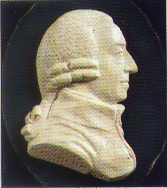 Adam Smith was born in Kirkcaldy, Scotland. He studied at the
universities of Glasgow and Oxford. He became a professor in
1751 at Glasgow university where he lectured on problems of
Moral Philosophy.
Adam Smith was born in Kirkcaldy, Scotland. He studied at the
universities of Glasgow and Oxford. He became a professor in
1751 at Glasgow university where he lectured on problems of
Moral Philosophy.
In his 'Theory of Moral Sentiments' (1759) he inquired how man, who is a creature of self-interest, can form moral judgements in which self-interest seems to be transmuted to a higher plane. In his 'Wealth of Nations' (1776) he attacked the British mercantile system's limits on free trade. He attempted to deduce what would happen to trade and industry if governments refrained from interfering with individuals natural behavior. Adam Smith maintained that unrestricted market forces are self-regulating, that is, one can do as one pleases in the market. But if one pleases to do what the market disapproves, the price is economic ruination due to competition. He therefore advocated the capitalist free enterprise system, based on the belief that men are motivated by rational self-interest. But he also argued that labour, not capital or real estate, is of primary value, a point often overlooked today.
Adam Smith is generally portrayed as the original capitalist defender. The
following quote from 'Wealth of Nations' will therefore come as a surprise:
|
| People: 1500-2000 |